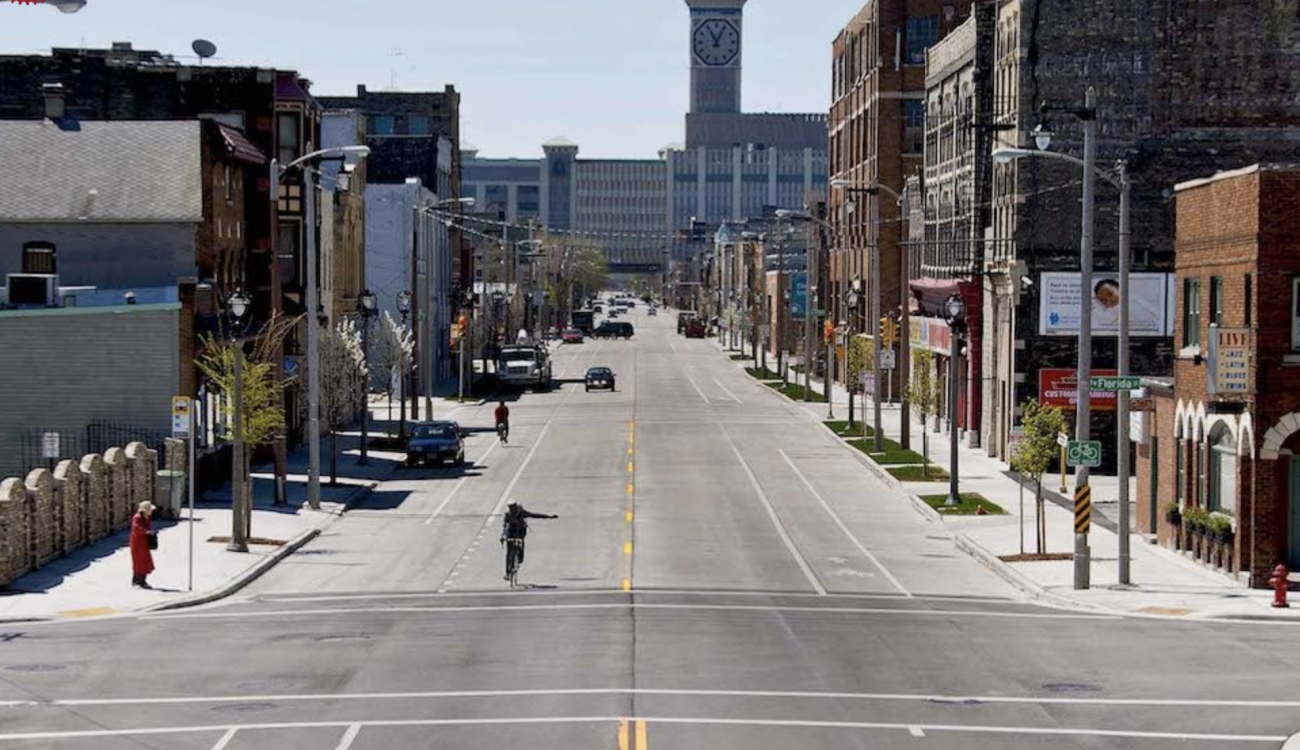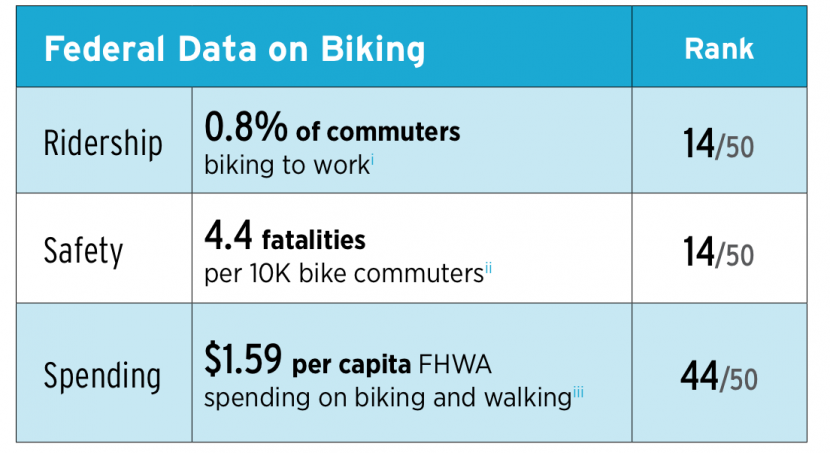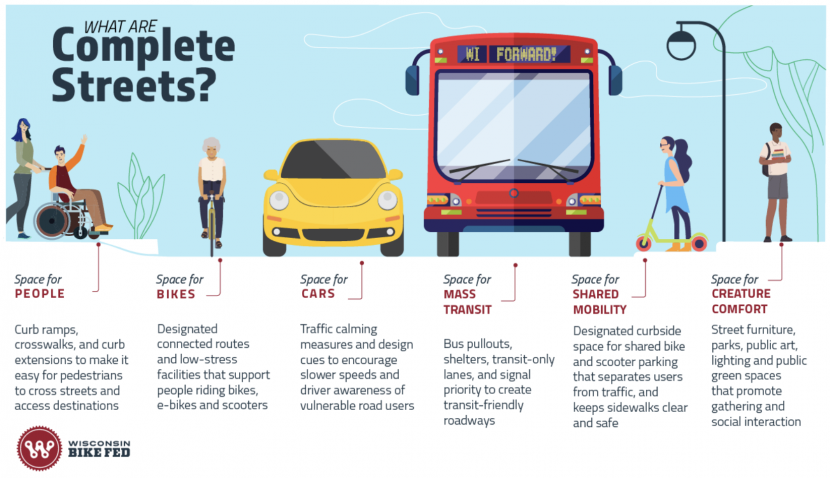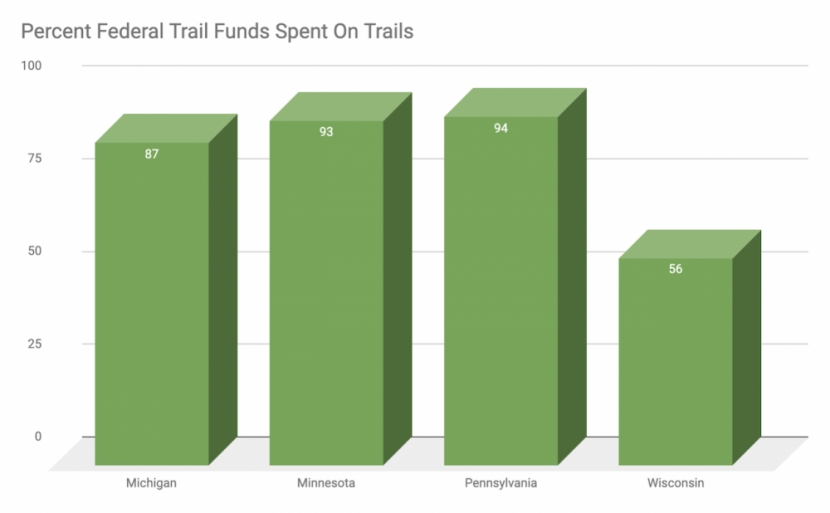
Governor’s Task force on Climate Change
This week I gave a presentation about how bicycling could be a low cost and effective mitigation strategy for global warming at the fifth and final listening session of Governor Evers’ Task Force on Climate Change.
If people honestly want to do something to mitigate climate change, one of the easiest and most cost effective thing we can do is to replace short trips by car with bicycling or walking. To encourage more people to do that though, we need to make trips by bicycle safer and more convenient with better infrastructure.
To do that, Wisconsin needs to invest more in trails, protected bike lanes and safe street networks. I made the point that Wisconsin ranks 44th of 50 states in spending on infrastructure to make cycling safer and more convenient.
Data from the 2017 National Household Travel Survey found the majority (59.4%) of motor vehicle trips in the US were less than six miles and car trips of under a mile add up to about 10 billion miles per year! If we only replaced half of those car trips with biking and walking, we could save about 2 million metric tons of CO2 emissions per year. The total financial savings are even bigger — almost $900 million dollars — when you include savings on maintenance and tire replacement.

There are lots of studies about how replacing short car trips with bike trips would benefit the environment. A 2010 study by Maggie Grabow of the Nelson Institute for Environmental Studies Center for Sustainability and the Global Environment University of Wisconsin‐Madison found that if 20 percent of people used bikes instead of cars for short trips in Milwaukee and Madison, Wisconsin, 57,405 fewer tons of carbon dioxide would be emitted.
A 2015 study by the Institute for Transportation and Development Policy concluded that a dramatic increase (about 20 percent) in cycling worldwide could “cut carbon dioxide emissions from urban passenger transport by nearly 11 percent in 2050.”
From a lengthy list of recommendations under consideration, the Bike Fed was invited to speak about the few that related specifically to active transportation. The Bike Fed recommends prioritizing the following legislative actions specifically if we want to encourage more people to take short trips on foot or by bike:
Reinstate Complete Streets
Complete streets prioritize the safety of all people using the street over the speed of moving cars. Complete Streets often have slower speed limits, wide and maintained sidewalks and crosswalks, pedestrian focused lighting, protected bike lanes, bus lanes and bus shelters, and beautification like trees and plantings.

These prioritizations aim to improve public health and safety, have the ability to significantly improve the economy, and take positive action towards climate resilience. A policy commitment for safer streets, through the guiding principles of Complete Streets, has a proven track record of improving the quality of life and the natural environment – nationally as well as right here in the state of Wisconsin.
In 2009 the Wisconsin Bike Fed worked to get a Complete Streets Law passed at the state level which required all road projects built with state or federal funds to include accommodations for people biking and walking Since 2009, 17 additional local Complete Streets policies were passed. The City of Milwaukee’s Complete Streets resolution, for example, was recognized as the third best policy in the country
In 2015’s budgetary season, however, Wisconsin’s Statewide Complete Streets law was repealed. Wisconsin remains the only state to ever repeal its Complete Streets legislation
On July 1st, the US house of representatives passed the INVEST in America Act which calls for a Federal Complete Streets Policy. This transportation bill includes other important improvements for safety and equity including additional funds for local communities for Transportation Alternatives.
Transportation Alternative (TAP) Funds are money set aside for “a variety of smaller-scale transportation projects such as pedestrian and bicycle facilities, recreational trails, safe routes to school projects, community improvements such as historic preservation and vegetation management, and environmental mitigation related to stormwater and habitat connectivity”.
TAP Money is awarded in a competitive grant process filtered through Metropolitan planning organizations to ensure fair distribution across the state. TAP money provides 80% of a transportation project budget with the local entity providing 20% in matching dollars. Amounts available to states are set in Federal Transportation Bills. A State may transfer up to 50% of TAP funds made available each fiscal year to highway programs, which WI has done every year since inception of this funding option. In Wisconsin this equates to approximately $7 Million per year diverted – as a result, only 25% of non motorized transportation projects submitted can be funded.
The diversion of TAP funds to highway projects negatively impacts our environment by defunding projects that can help reduce short car trips by making it safer and more enjoyable to walk or bike in communities across Wisconsin.
Eminent Domain
Separately, but linked to Complete Streets is the use of eminent domain for pedestrian and bike trails. Often the use of eminent domain to obtain easements for Complete Streets – or any road construction project is necessary. However, the 2017 budget bill, Act 59, amended Wisconsin’s Eminent Domain Statute to prohibit authorities from using the power of condemnation to establish or extend recreational trails, pedestrian ways, bicycle way, or bicycle lanes.
The 2019 Economic Impact of Bicycling in Wisconsin study, commissioned by the Governor’s Coordinating Bicycle Council, confirmed that cycling is big business in Wisconsin – bringing 1.42 billion dollars into our state annually. Wisconsin is a leader in bicycle- related industry, but ranks 44th out of 50 states on the amount we spend on bicycling and walking – just $1.59 per capita.

The task force was created by Governor Evers last year through an executive order. It is chaired by Lieutenant Governor Mandela Barnes and also includes legislators, cabinet secretaries and appointees from the agriculture, utility and tourism industries as well as higher education and indigenous nations. They have been tasked with advising Governor Evers on policies to address global climate change by the end of October, 2020 so that some initiatives get included in the next state budget.
The Bike Fed commends the Governor’s Task Force on Climate Change for the comprehensive list of policy recommendations under review. We ask that you prioritize those that focus on Active Transportation as these projects can reduce carbon emissions by shortening and reducing the number and length of car trips people need to take, while focusing on transportation equity, and safety for people of all ages and abilities.